Serbophilia
Serbophilia (Serbian: Србофилија, romanized: Srbofilija, literally love for Serbia and Serbs) is a non-Serbian person who expresses a strong interest, strong positive predisposition, or appreciation for the Serbian language, Serbian culture, Serbian literature, Serbian History, Serbian nationalism, Serbian Government (Serbia Monarchy / Serbian Empire ), Serbian cuisine, Serbian people and Serbia, etc.
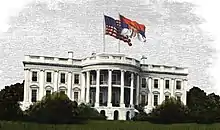
Artistic depiction of a July 1918 event in which a Serbian flag was flown over the White House alongside the U.S. one in a show of wartime solidarity; the only non-U.S. flags to have ever been flown over the White House are those of Serbia and France.
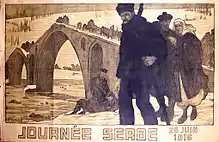
French poster from WWI
| Part of a series of articles on |
| Serbs |
|---|
 |
Serbophiles
.svg.png.webp) Johann Wolfgang von Goethe — famous German writer, poet, scientist, artist and politician [1]
Johann Wolfgang von Goethe — famous German writer, poet, scientist, artist and politician [1].svg.png.webp) Jacob Grimm — German philologist, jurist and mythologist. Learnt Serbian in order to read Serbian epic poetry.[2][3]
Jacob Grimm — German philologist, jurist and mythologist. Learnt Serbian in order to read Serbian epic poetry.[2][3].svg.png.webp) Archibald Reiss — German-Swiss publicist, chemist, forensic scientist, a professor at the University of Lausanne.[4]
Archibald Reiss — German-Swiss publicist, chemist, forensic scientist, a professor at the University of Lausanne.[4] Victor Hugo — French poet, novelist, and dramatist of the Romantic movement.[5] Hugo wrote the speech Pour la Serbie.
Victor Hugo — French poet, novelist, and dramatist of the Romantic movement.[5] Hugo wrote the speech Pour la Serbie. Helen of Anjou
Helen of Anjou Mircea I and Vlad III Dracula [6]
Mircea I and Vlad III Dracula [6]- Several notable composers used motifs from Serbian folk music and composed works inspired by Serbian history or culture, such as:[7]
 Rebecca West (1892–1983) — British travel writer. Was described by American media as having a pro-Serbian stance.[8]
Rebecca West (1892–1983) — British travel writer. Was described by American media as having a pro-Serbian stance.[8] Flora Sandes — British Irish volunteer in World War I.
Flora Sandes — British Irish volunteer in World War I. Ruth Mitchell — American volunteer in the Chetniks, World War II. Sister of Billy Mitchell.
Ruth Mitchell — American volunteer in the Chetniks, World War II. Sister of Billy Mitchell. Peter Handke — Austrian novelist and playwright, Nobel Prize winner. Supported Serbia in the Yugoslav Wars.[9]
Peter Handke — Austrian novelist and playwright, Nobel Prize winner. Supported Serbia in the Yugoslav Wars.[9] Eduard Limonov — Russian writer and poet.[10]
Eduard Limonov — Russian writer and poet.[10] Ángel Pulido — Spanish physician, publicist and politician, who stood out as prominent philosephardite during the Restoration [11]
Ángel Pulido — Spanish physician, publicist and politician, who stood out as prominent philosephardite during the Restoration [11] Essad Pasha Toptani — Ottoman Albanian politician.[12]
Essad Pasha Toptani — Ottoman Albanian politician.[12] J. R. R. Tolkien — English writer, poet, philologist, and academic [13]
J. R. R. Tolkien — English writer, poet, philologist, and academic [13]_crowned.svg.png.webp) Anna Dandolo
Anna Dandolo Józef Bartłomiej Zimorowic[14][15]
Józef Bartłomiej Zimorowic[14][15] Adam Jerzy Czartoryski [16]
Adam Jerzy Czartoryski [16] Adam Mickiewicz [17]
Adam Mickiewicz [17] Pavel Jozef Šafárik — Slovakian philologist, poet, literary historian, historian and ethnographer in the Kingdom of Hungary. He was one of the first scientific Slavistics [18]
Pavel Jozef Šafárik — Slovakian philologist, poet, literary historian, historian and ethnographer in the Kingdom of Hungary. He was one of the first scientific Slavistics [18] Ján Kollár — Slovakian writer (mainly poet), archaeologist, scientist, politician, and main ideologist of Pan-Slavism. [19]
Ján Kollár — Slovakian writer (mainly poet), archaeologist, scientist, politician, and main ideologist of Pan-Slavism. [19] Ľudovít Štúr — Slovakian revolutionary politician and writer. [20]
Ľudovít Štúr — Slovakian revolutionary politician and writer. [20] Henry Bax-Ironside — British diplomat.[21]
Henry Bax-Ironside — British diplomat.[21] Diego Maradona [22]
Diego Maradona [22] Herbert Vivian — British journalist and author of Servia: The Poor Man's Paradise and The Servian Tragedy: With Some Impressions of Macedonia.[23]
Herbert Vivian — British journalist and author of Servia: The Poor Man's Paradise and The Servian Tragedy: With Some Impressions of Macedonia.[23].svg.png.webp) Alexander Kolchak [24]
Alexander Kolchak [24].svg.png.webp) August von Mackensen
August von Mackensen Malvina Hoffman — American sculptor and lobbyist for the Serbian cause in WWI.
Malvina Hoffman — American sculptor and lobbyist for the Serbian cause in WWI. Yu Hua — Chinese author[25]
Yu Hua — Chinese author[25] Naguib Mahfouz — Egyptian Nobel Prize winner.[26]
Naguib Mahfouz — Egyptian Nobel Prize winner.[26]
Gallery
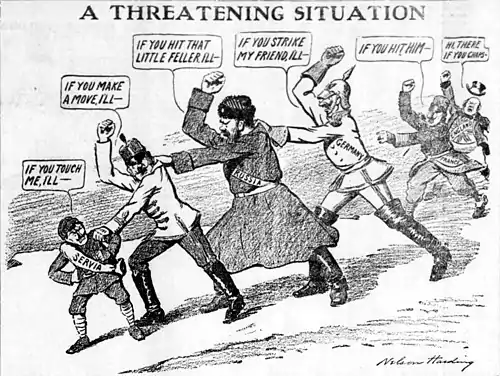 "A Threatening Situation", a comic published in the American newspaper the Brooklyn Eagle in July 1914
"A Threatening Situation", a comic published in the American newspaper the Brooklyn Eagle in July 1914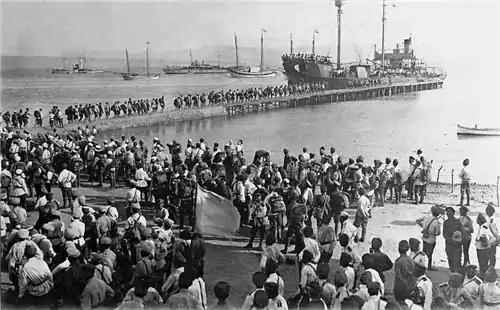 Departure for Serbia
Departure for Serbia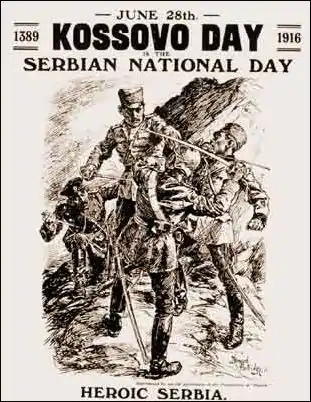 WWI poster - Kosovo Day, June 28, 1916, published in solidarity with the Serb allies
WWI poster - Kosovo Day, June 28, 1916, published in solidarity with the Serb allies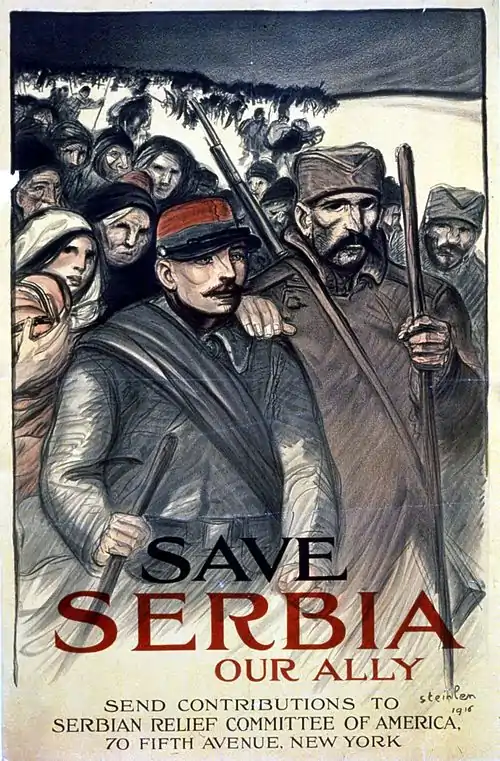 WWI poster - Save Serbia (1915)
WWI poster - Save Serbia (1915)
References
- http://www.gmbooks.com/product/SerbMusicGM.html
- Donald Haase (2008). The Greenwood Encyclopedia of Folktales and Fairy Tales: G-P. Greenwood Publishing Group. pp. 531–. ISBN 978-0-313-33443-6.
- Selvelli, Giustina. "The Cultural Collaboration between Jacob Grimm and Vuk Karadžić. A fruitful Friendship Connecting Western Europe to the Balkans". Cite journal requires
|journal=(help) - http://www.skss.ch/index.php?option=com_content&view=article&id=107:pouke-arcibalda-rajsa&catid=50:ch-sr&lang=de
- "Les Misérables author Victor Hugo: Champion of Serbs « Britić". Retrieved 25 January 2020.
- Ion Pătroiu (1987). Marele Mircea Voievod. Editura Academiei Repubvlicii Socialiste România. p. 460.
- Tomić, Dejan (2019). Srbi i evropski kompozitori: srpska muzika i Srbi u delima evropskih kompozitora, od XIX do početka XXI veka. Novi Sad: RTS. ISBN 978-86-6195-173-2, 978-86-81086-31-5
- Victoria Glendinning (1988). Rebecca West: A Life. Fawcett Columbine. p. 176. ISBN 978-0-449-90320-9.
- K. Stuart Parkes (January 2009). Writers and Politics in Germany, 1945-2008. Camden House. pp. 174–. ISBN 978-1-57113-401-1.
- "LIMONOV Junak našeg doba". Печат - Лист слободне Србије (in Serbian). Retrieved 8 April 2019.
- "in Serbia at Belgrade told him "I am not Spanish from there [Spain], but Spanish from the East." Andreu, Miguel Rodríguez (31 January 2017). "Serbia fuera del radar estratégico de España". esglobal. https://www.esglobal.org/serbia-del-radar-estrategico-espana Retrieved 8 June 2018.
- The Ottman Empire and Its Successors, 1801 -1927. CUP Archive. pp. 529–. GGKEY:5L37WGKCT4N.
- http://www.tolkienlibrary.com/press/1135-unlocking-tolkien-inspirations.php
- Józef Bartłomiej Zimorowic (1857). "Śpiewacy" (in Polish). Kazimierz Józef Turowski, ed. Sielanki Józefa Bartłomieja i Syzmona Zimorowiczów. The Internet Archive. p.39
- Balazs Trencsenyi; Michal Kopecek (1 November 2006). National Romanticism: The Formation of National Movements. Central European University Press. pp. 240–. ISBN 978-963-7326-60-8.
- Kosta St Pavlović (1943). The struggle of the Serbs. The Standard art book co.
- name="Kuzmanović, Nebojša (2004). "Susretanje kultura, pledoaje za izučavanje srpsko - slovačkih književnih veza". Sunčanik. Bačka Palanka."
- name="Kuzmanović, Nebojša (2004). "Susretanje kultura, pledoaje za izučavanje srpsko - slovačkih književnih veza". Sunčanik. Bačka Palanka."
- name="Kuzmanović, Nebojša (2004). "Susretanje kultura, pledoaje za izučavanje srpsko - slovačkih književnih veza". Sunčanik. Bačka Palanka."
- Hidryma Meletōn Chersonēsou tou Haimou. Hidryma Meletōn Chersonēsou tou Haimou. 1971.
- https://www.telegraf.rs/english/3268567-maradona-sings-iconic-serbian-patriotic-song-with-dule-savic-diegos-forgotten-video-surfaces
- Bled, Jean-Paul; Terzić, Slavenko (2001). Europe and the Eastern Question (1878-1923): Political and Organizational Changes. Istorijski institut SANU. pp. 324–325. ISBN 978-86-7743-023-8.
- Acović, Dragomir (2012). Slava i čast: Odlikovanja među Srbima, Srbi među odlikovanjima. Belgrade: Službeni Glasnik. p. 632.CS1 maint: ref=harv (link)
- Serbia, RTS, Radio televizija Srbije, Radio Television of. "Ју Хуа за РТС: Волим Србију, долазим чим прође пандемија". www.rts.rs. Retrieved 28 April 2020.
- Serbia, RTS, Radio televizija Srbije, Radio Television of. "Нагиб Махфуз, нобеловац који није волео да путује, осим у Београд". www.rts.rs. Retrieved 17 January 2021.
Sources
- Sells, David (1997). Serb 'Demons' Strike Back (Royal Institute of International Affairs) Vol. 53, No. 2
This article is issued from Wikipedia. The text is licensed under Creative Commons - Attribution - Sharealike. Additional terms may apply for the media files.
